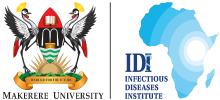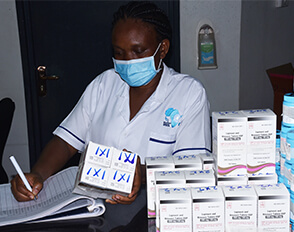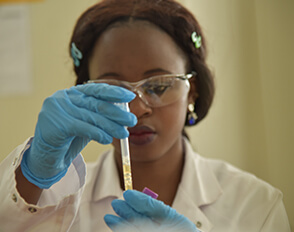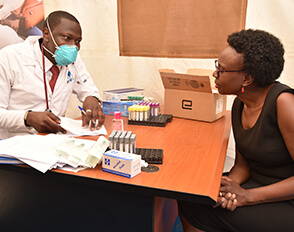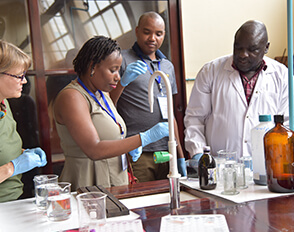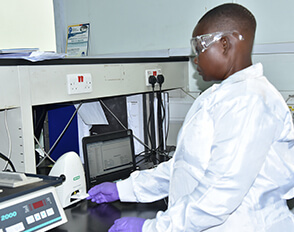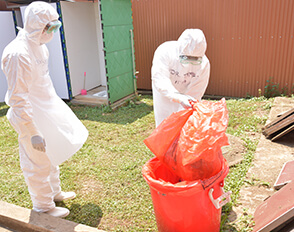
Comprehensive HIV/AIDS project in Masindi and Hoima districts
On June 28 in Masindi district and on June 29, 2017 in Hoima district, the Infectious Diseases Institute (IDI) organized and held the second Annual Performance Review meeting for its Western Region Comprehensive HIV/AIDS project funded by the Centres for Disease Control and Prevention (CDC).
Through the Comprehensive HIV/AIDS project, IDI provides HIV prevention, care and treatment services by strengthening District Health Systems at district, health facility and community levels. As such, the meeting brought together key players at the national and district level to jointly discuss key strategies to address identified gaps as well as guide districts in achieving set targets for the next financial year (April 2017 to March 2018). The meeting also highlighted district progress thus far, discussed challenges met, and revealed lessons learned during project implementation.
In his opening remarks, Dr. Alex Muganzi the Head of the Outreach programme at IDI commended the districts for the gains made thus far in providing comprehensive HIV/AIDS care services. Dr. Muganzi further expressed that IDI as a leading provider of HIV services in the region is pushing for increased identification of HIV positive individuals, linking and retaining them in HIV care and treatment as well as ensuring that those on antiretroviral therapy are virally suppressed through the Differentiated Service Delivery Models (DSDM).
Dr. Muganzi, highlighted that the DSDM model uses selected community-based sites to serve as drug pick-up points for ‘stable’ patients. “Now ‘stable’ HIV positive persons shall pick their drugs from the centres within their localities instead of trekking long distances to health facilities as has been the case,” said Dr. Muganzi. He added that this approach will help reduce on the distance these clients have to travel to get their ARVS at the main health facilities thereby offsetting transport costs for clients, improving adherence to treatment and ultimately leading to improved access and client retention in care. He also called for ensuring that voluntary male medical circumcision services are provided to all males ten years and above for HIV/AIDS prevention.
Also in attendance was Dr. Donna Kabatesi, CDC, Associate Director of Programs who stated that the differentiated service delivery models will give a big push towards the achievement of the first, second and third UNAIDS 90:90:90 targets of ensuring that 90 percent of all people living with HIV know their status, 90 percent of all people diagnosed with HIV infection receive sustained antiretroviral therapy, and 90 percent of all people receiving antiretroviral therapy are virally suppressed, by 2020.
In her closing remarks, Dr. Kabatesi urged IDI to target populations at the greatest risk and in urgent need of services. “Encourage men to test with their partners. Men remain a bigger part of those that need special interventions for HIV testing, linkage and retention in HIV care and treatment programs. A large number of young men do not know their HIV status. We need to work together to find men who are HIV positive and enroll them in care so as to close the tap of new infections,” said Dr. Kabatesi.
Also in attendance were representatives Ministry of Health – AIDS Control Program, CDC Uganda, Uganda AIDS Commission, Central Public Health Laboratories, National Medical Stores, Implementing Partners, District leaders, Cultural leaders, and Community Based Organizations, as key stakeholders in comprehensive HIV/AIDS services in the nine districts of Kiboga, Kyankwanzi, Hoima, Buliisa, Masindi, Kiryandongo, Kibaale, Kagadi and Kakumiro. The project has been in implementation since April 2015.
